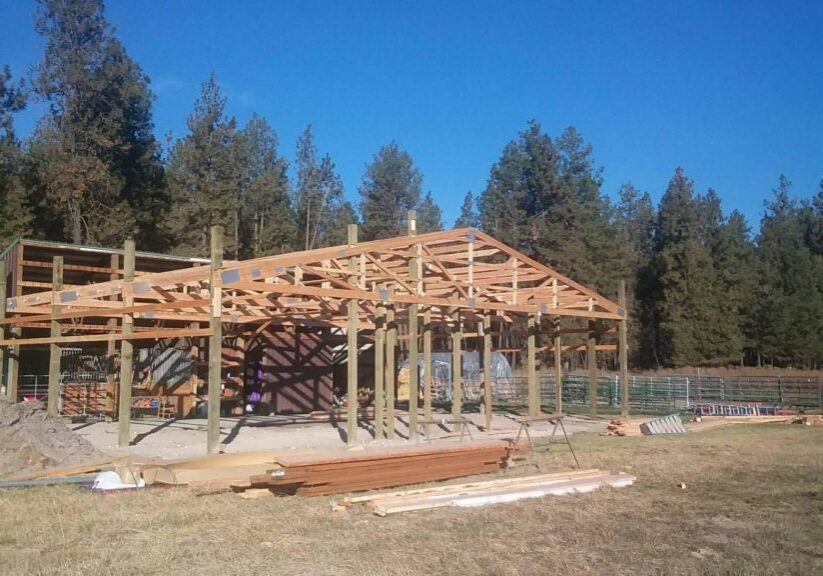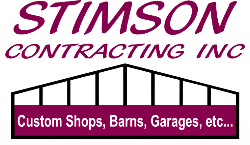What You Need to Know Before Building a Pole Barn in Spokane
Here at Stimson Contracting, we’ve helped hundreds of property owners in and around Spokane turn empty land into fully functional, customized pole barns. Whether it's a classic horse barn, a multi-bay shop, a barndominium, or a hybrid building for farm and family, we know one thing for sure: Spokane is a great place to build—but you need to know the rules, the land, and the process to get it right.
Every region has its quirks, and Spokane is no exception. From snow load requirements and zoning rules to rural access roads and well water regulations, there are several local factors you need to account for before you break ground.
In this article, I’ll walk you through everything you need to know before building a pole barn in Spokane—so you can avoid costly delays and get your project moving smoothly from day one.
Table of Contents
Understand Spokane’s Climate and Terrain
Check Zoning and Land Use Restrictions
Know Your Snow Load and Wind Load Requirements
Secure the Right Permits
Consider Utilities and Site Prep
Work with Spokane County for Rural Builds
Choose the Right Building Orientation
Understand Access Roads and Delivery Routes
Think Ahead About Expansion and Resale
Work with a Local Pole Barn Expert
Why Stimson Contracting Knows Spokane
Let’s Build It Right—From Day One
1. Understand Spokane’s Climate and Terrain
Spokane’s weather can be tough on buildings if you don’t plan accordingly. We see a wide range of conditions—hot summers, freezing winters, heavy snow, and occasional high winds.
The terrain is just as varied: from rocky hillsides to low-lying farmland to forested areas. All of these factors impact how your pole barn needs to be designed and engineered.
We always begin projects with a site evaluation so we can match the structure to the land and climate. You don’t want to be surprised halfway through construction.
2. Check Zoning and Land Use Restrictions
Before you start planning your pole barn, make sure your land is zoned appropriately for your intended use. Spokane County has specific zoning classifications (AG, RA, RURAL CONSERVATION, etc.), each with its own rules for what you can build and where.
Key zoning considerations include:
Setbacks from property lines
Building height limits
Residential vs. commercial use
Livestock or agricultural allowances
We help our clients navigate these restrictions and confirm compliance before we submit plans.
3. Know Your Snow Load and Wind Load Requirements
Spokane’s winters are no joke, and the county requires that all pole barns meet strict snow load standards—typically between 30 and 70 pounds per square foot, depending on elevation and location.
Wind load requirements are also a factor, especially in open areas outside the city.
We custom-engineer every pole barn to meet or exceed these standards so your building stands strong for decades, no matter what the Inland Northwest throws at it.
4. Secure the Right Permits
Permitting in Spokane is handled through Spokane County Building and Planning. You'll need a permit for nearly all new structures—including agricultural and residential pole buildings.
You’ll need to provide:
We handle the permitting process for our clients to ensure it’s done right the first time and to avoid unnecessary delays.
5. Consider Utilities and Site Prep
Is your building going to have:
Electricity?
Running water?
Sewer or septic?
Propane or heat?
If you’re building in rural Spokane, you’ll need to plan for utility hookups or off-grid alternatives. Trenching, transformer placement, well access, and septic design should all be discussed during the planning phase.
We coordinate with utility providers and subcontractors to streamline this process and avoid surprises down the line.
6. Work with Spokane County for Rural Builds
If your property is outside city limits, you’ll be working directly with Spokane County for all inspections, permits, and code compliance.
Rural builds often involve additional factors like:
Our experience working with Spokane County makes us efficient and accurate when handling rural pole barn projects.
7. Choose the Right Building Orientation
Spokane’s climate makes building orientation a key consideration.
A few design tips we often recommend:
Orient entrances away from prevailing wind direction
Maximize natural light with southern exposure windows
Consider snow shed direction on roofing
Plan access for winter vehicle clearance
It’s a simple step that adds big value to year-round usability.
8. Understand Access Roads and Delivery Routes
Some Spokane builds—especially in rural or wooded areas—have tight access roads that can impact material delivery or equipment staging.
We evaluate driveways, slopes, and turnaround areas early so we can plan efficient construction and avoid mid-project roadblocks (literally and figuratively).
9. Think Ahead About Expansion and Resale
Even if you’re just building a shop or barn today, it pays to think ahead.
Ask yourself:
Will I want to add on later?
Could this building increase resale value?
Should I rough-in utilities or a foundation now for future use?
We design with long-term flexibility in mind so your building grows with you, not against you.
10. Work with a Local Pole Barn Expert
Choosing a contractor who knows Spokane is one of the most important decisions you’ll make. Local experience means:
Familiarity with inspectors and permit staff
Engineering tailored to our regional climate
An understanding of rural logistics
We’ve built everything from horse barns to heated shops to hybrid commercial structures all over Spokane County—and we know what it takes to get them done right.
11. Why Stimson Contracting Knows Spokane
We’re not just builders—we’re Spokane locals. For decades, we’ve served this community with pride, transparency, and rock-solid craftsmanship.
We know:
The county’s permitting quirks
What materials hold up best here
How to plan around Inland Northwest weather
The details that make the difference in resale, maintenance, and usability
When you work with us, you’re getting a builder who’s been here, done it, and will do it right again—for you.
12. Let’s Build It Right—From Day One
If you’re planning to build a pole barn in Spokane, start with a team who knows the region and respects your vision. At Stimson Contracting, we walk you through every step—from planning and permitting to design and final inspection.
Whether it’s a shop, barn, garage, barndominium, or commercial building, we’ll make sure it’s built to last, to code, and to your standards.
Stimson Contracting, Inc.
Locally Built. Professionally Engineered. Spokane Strong.


 Call today to schedule a free site consultation 509.244.2636
Call today to schedule a free site consultation 509.244.2636
